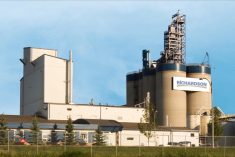The grain handler built out from the foundations of the former Prairie pools is set to be absorbed into one of the world’s biggest grain trading firms in a cash-and-stock deal.
After the news leaked out last month, Rotterdam-based Viterra confirmed Tuesday morning it’s “concluded an agreement” to merge into Bunge — the St. Louis-based “B” in the “ABCD” of the companies handling the bulk of global grain trade — under the latter company’s banner.
Read Also

U.S. grains: Soybeans rise on China demand hopes; corn and wheat rebound
Chicago Board of Trade soybean, corn and wheat futures rose on Monday on signs of progress towards the end of a record-long U.S. government shutdown, along with expectations of a revival of U.S. soybean exports to China, analysts said.
Viterra’s shareholders, which include international commodities trader Glencore, the Canada Pension Plan Investment Board and British Columbia Investment Management Corp., will receive about 65.6 million shares in Bunge — worth about $6.2 billion — and $2 billion cash (all figures US$).
Once a $2 billion share repurchase plan Bunge announced in tandem with the merger is completed, the Viterra shareholders would together hold about 33 per cent of the merged company, up from 30 when the merger deal closes. Viterra shareholders would not take part in the share buyback plan.
The deal also calls for Bunge to assume about $9.8 billion in Viterra debt.
“Our highly complementary asset footprints will create a network that connects the world’s largest production regions to areas of fastest growing consumption, enhancing the geographical balance and adaptability of our global value chains and benefitting farmers and end-customers,” Bunge CEO Greg Heckman said in a release.
“In combining our highly complementary origination, processing and distribution networks, we are better positioned to meet the increasing demand for the food, feed and fuel products we offer,” Viterra CEO David Mattiske said in the same release.
“Together, we will play a leading role in the future of the agriculture industry, developing fully traceable, sustainable supply chains and moving towards carbon-neutral operations, while creating a strong growth platform for our combined business.”
Heckman and Bunge CFO John Neppl would remain in their posts with the merged firm, while Mattiske would become the new firm’s “co-chief operating officer.”
The two companies said the combination is expected to generate about $250 million per year in gross pre-tax “operational synergies” within three years of closing, plus “significant incremental network synergies” and “relatively more stable cash flows from the larger, more diversified footprint.”
Those synergies, Heckman said on a conference call later Tuesday morning, would not be based on reduced staff head count but rather mainly on “operational” synergies such as asset utilization and procurement savings. In terms of human capital, he said access to talent in the agrifood sector is “at a premium.”
The combined firm would be based in St. Louis, where Bunge relocated its global head office from White Plains, N.Y. in 2019. Rotterdam, where Viterra’s global head office sits today, “will be an important commercial location in the future of the combined company.”
Glencore and CPP Investments would each be able to name two members to the merged Bunge board, while Bunge would nominate the remaining eight. Glencore and CPP’s shareholder agreements with Bunge also include a 12-month lock-up period on sales of Bunge shares.
For its part, Toronto-based CPP Investments said separately its 40 per cent stake in Viterra will translate to about a 12 per cent equity stake in Bunge and about $800 million.
On Tuesday’s conference call, Bunge said its own shareholders would have 70 per cent equity in the combined firm when the deal closes, while Glencore would have 15 per cent and BCIC, three per cent.
“Combining these two highly complementary companies will create an enhanced agribusiness that can provide an expanded product offering to end-customers, with an increased ability to innovate and promote sustainable practices in the global food supply,” Bruce Hogg, head of sustainable energies with CPP Investments, said in a separate release.
Glencore CEO Gary Nagle, in a separate release, said the deal “is expected to realize significant value for Glencore” and described the planned merged group as “a premier pure-play agribusiness solutions company, well placed to meet increased global demand as well as the ongoing challenge of providing sustainable, traceable food and feed products to customers around the world.”
Bunge and Viterra said the merger is expected to close in mid-2024, subject to the usual closing conditions, including approval by Bunge shareholders and the relevant regulatory approvals.
Those approvals are likely to include review by Canada’s Competition Bureau, given Viterra’s significant stakes in Prairie grain handling, oilseed crushing and port terminal capacity, and Bunge’s stakes in Canadian crushing and its part-ownership of Prairie grain handler G3.
Asked on Tuesday’s conference call about any plans to divest assets to appease regulators in countries where the two firms operate, Neppl described the companies’ asset footprints as “very complementary” and said Bunge looks forward to working with regulators and “helping them to understand the footprint.”
Viterra formed in 2007 in a merger of Saskatchewan Wheat Pool with Agricore United — the latter having formed in a 2001 merger of the former Alberta and Manitoba wheat pools with another former Prairie grain co-operative, United Grain Growers (UGG).
The Regina-based firm went international in 2009 with a deal for Australia’s ABB Grain, then was majority-acquired by Glencore in 2012, becoming Glencore Agriculture before rebranding as Viterra internationally in 2020. It expanded its U.S. footprint last year with a takeover of grain firm Gavilon.
Bunge formed as a trading company in Amsterdam in 1818, expanding to Argentina in 1884, Brazil in 1905 and North America in 1918, moving its global headquarters from Brazil to the U.S. in 2001, when it became a publicly traded company.
Bunge’s stake in Winnipeg-based G3 was acquired through a joint venture with a Saudi state grain firm in 2015, which bought the assets of the privatized Canadian Wheat Board. — Glacier FarmMedia Network















